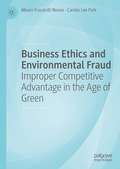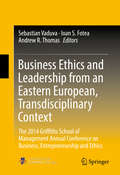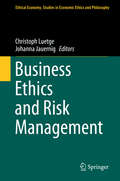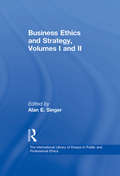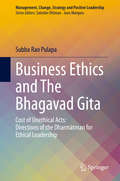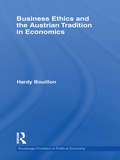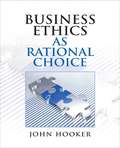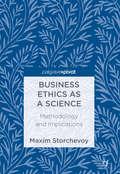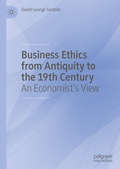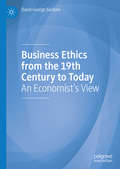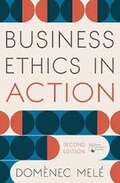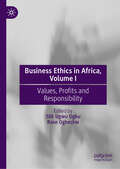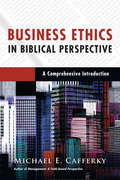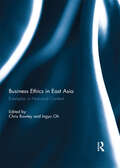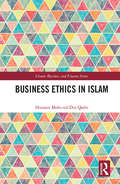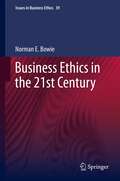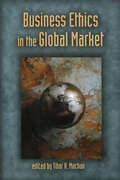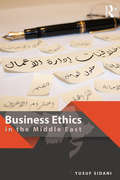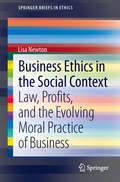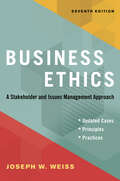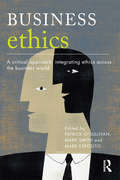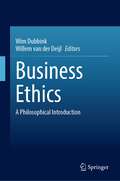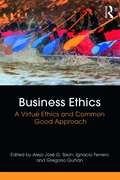- Table View
- List View
Business Ethics and Environmental Fraud: Improper Competitive Advantage in the Age of Green
by Mauro Fracarolli Nunes Camila Lee ParkAs environmental legislation grows more stringent in response to the escalating climate crisis, some of the world’s largest corporations have adopted fraudulent mechanisms to keep their margins of profit, and achieve improper competitive advantage. Such mechanisms can lead to problems in the supply chain, a decrease in market value, diminished trust in brands, increased surveillance of companies, as well as damage to the environment. This book offers a holistic view of the nature and consequences of environmental fraud, bringing together practical examples, empirical research data, and management theory. It will be of interest to academics working in the fields of sustainability management, business ethics, and corporate social and environmental responsibility.
Business Ethics and Leadership from an Eastern European, Transdisciplinary Context: The 2014 Griffiths School of Management Annual Conference on Business, Entrepreneurship and Ethics
by Andrew R. Thomas Ioan S. Fotea Sebastian VaduvaThis book aims to provide insight into the fields of business and leadership by examining the role of ethics in these areas. The papers in this book derive from the 2014 Annual Griffiths School of Management International Conference, organized by Emanuel University of Oradea, Romania, where academics and practitioners interacted and discussed current insights and research in the different dimensions of business ethics and leadership. This resulting book offers empirical and theological research on ethics, business and leadership from a transdisciplinary and knowledge- based context. Since the financial crisis in 2008, the debate on business ethics and leadership has dominated the public sphere at all levels of interest, from grassroots to the elites in educational institutions, governments, businesses and NGOs. Naturally, constructive and transdisciplinary discussions need to take place, with due consideration for the specific context of each situation, so that propositions upon which to build the future can be formulated. These discussions unfold in an ever more intricate world of business, powered by ever more pervasive and intelligent technology and scientific development, all brought together by globalization. In this world, organizations are faced with new and more complex ethical issues in their pursuit to serve clients, gain profits, motivate employees, collaborate with partners and act responsibly towards society and the environment. A wise approach to changing the future is to understand the mistakes of the past, because one must always learn how to overcome past mistakes in order to develop a better future. But a necessary approach to building a better future is looking at the world through a transdisciplinary mindset. This allows us to see the world as a complex who≤ it fosters creative interaction between fields of knowled≥ it opens doors for knowledge and innovation flows across disciplines; and it allows the tackling of complex problems and situations. Given the current context of our world, this is an approach that we ought to pursue. Featuring contributions from academics, researchers, scholars and practitioners from across the globe, this book will be of great interest for students and practitioners in the fields of business, leadership and ethics.
Business Ethics and Risk Management (Ethical Economy #43)
by Christoph Luetge Johanna JauernigThis volume explores various aspects of risk taking. It offers an analysis of financial, entrepreneurial and social risks, as well as a discussion of the ethical implications of empirical findings. The main issues examined in the book are the financial crisis and its implications for business ethics. The book discusses unethical behaviour as a reputational risk (e. g. , in the case of Goldman Sachs) and the question is raised as to what extent the financial crisis has changed the banks' entrepreneurial strategy. The book presents an analysis of the reasons leading to the crisis and identifies them as ethical dilemma structures. In addition, it looks at general questions regarding ethical behaviour and risk taking, such as: To what extent does the social embeddedness or abstraction play a role in guaranteeing ethical behaviour? What conclusions can be drawn from institutional or evolutionary perspectives on risk management? Finally, the book discusses further issues that become factors of risk within and between societies, such as work insecurity, corruption or the problem of facilitation payments as a risk in international transactions.
Business Ethics and Strategy, Volumes I and II (The International Library of Essays in Public and Professional Ethics)
by Alan E. SingerThis volume is intended as a reference for those interested in the relationship between business strategy and business ethics, broadly conceived. Several articles have been selected from various leading journals in management, strategy and ethics. An introductory chapter provides an overview of the articles but it also relates them systematically to a fundamental dualism involving values, ethics and politics, all viewed from the perspective of business and business studies.
Business Ethics and Sustainability
by Roman MeinholdThis book equips readers with the knowledge, insights and key capabilities to understand and practice business activities from ethical and sustainable vantage points. In our interconnected global business environment, the impacts of business activities are under increased ethical scrutiny from a wide range of stakeholders. Written from an international perspective, this book introduces the theory and practice of ethical and sustainable business, focusing in particular on eco-environmental sustainability, intergenerational responsibilities, current disruptive technologies, and intercultural values of the business community and consumers. Written by an expert author who also brings to the fore non-Western concepts and themes, this book: features positive case studies, as well as transferrable and applicable key insights from such cases; highlights the importance of taking cultural differences into account; takes a transdisciplinary approach which considers findings from research fields including conceptual and empirical business ethics, behavioral economics, ecological economics, environmental ethics, and the philosophy of culture; weaves in pedagogical features throughout, including up-to-date case studies, study questions, thought experiments, links to popular movies, and key takeaways. Written in an accessible and student-friendly manner, this book will be of great interest to students of business ethics, environmental ethics, applied ethics, and sustainable development, as well as business practitioners striving toward ethical, sustainable, and responsible business practice.
Business Ethics and The Bhagavad Gita: Cost of Unethical Acts: Directions of the Dharmatman for Ethical Leadership (Management, Change, Strategy and Positive Leadership)
by Subba Rao PulapaThe author of this book asserts that an absence of ethical leadership and unethical practices were the reasons for major global business scandals such as Enron, Satyam, Lehman Brothers, and WorldCom. This book analyses the causes for these unethical activities and interprets important verses from The Bhagavad Gita to show business executives and leaders how to lead ethically for the greater good of all stakeholders and society. As a remedy to avoid future scandals, the author points to several ethical directions, and the principle of Dharma, mentioned in The Bhagavad Gita by Lord Krishna, a major deity in Hinduism, who is considered Dharmātman (one who imbibes the Dharma). Written in conversation style using an executive education scenario, this book examines real world cases in various sectors like education, medical, non-government organizations (NGOs) and retail using the directions of the Dharmātman.
Business Ethics and the Austrian Tradition in Economics (Routledge Frontiers Of Political Economy Ser. #139)
by Hardy BouillonStakeholder value, corporate social responsibility and sustainability: Are these, and similar, concepts sufficiently clear for fruitful research in business ethics? What is the benchmark to prove their utility? Business Ethics and the Austrian Tradition in Economics is a treatise on the fundamental questions of business ethics and addresses significant shortcomings in the field. It is the result of correlating reflections on phenomena, resulting from an intersection of ethics, economics, methodology, and political and social philosophy. Sparked by the business ethicists’ tendency to consider certain areas outside their field and accept others unquestioningly, this book provides answers in the tradition of Austrian Economics and, in particular, of Hayek and Popper. Through detailed examination and reflection, this book presents the thesis that many themes in business ethics are discussed either unduly intensely, unbalanced or rarely, measured against what business ethics as a science should deliver. It does so by offering an answer to one of the most crucial questions in business ethics, namely that of justice in moral economic actions. Bouillon develops an original definition of morally just economic action in the course of three chapters, and subsequently uses it as yardstick, from which, in chapter four, he reads which of the relevant concepts and topics in business ethics ask for restatement. As a side-product Bouillon discloses logical inconsistencies in prominent political philosophies, and the consequences of these inconsistencies for maldevelopments in business ethics. Business Ethics and the Austrian Tradition in Economics illustrates and analyses the business etchics’ peculiarities particularly within German literature, providing the reader with a focus rarely found elsewhere. This book should be of interest to economics postgraduates and researchers looking at business ethics, economic theory, and social and political philosophy.
Business Ethics as Rational Choice
by John HookerBusiness Ethics as Rational Choice focuses on building decision-making skills so that readers can arrive at, and defend, personal or company decisions in an objective, and convincing, manner.
Business Ethics as a Science: Methodology and Implications
by Maxim StorchevoyThe book considers how to make the methodology of business ethics more scientific, especially its normative branch. Storchevoy explores the attempts of economic theory to contribute to the scientific normative analysis of economic behavior, particularly the welfare economics of 1910-1950 and methodological discussions of economics and ethics from 1980-2015. He then examines the development of the methodological structure of business ethics in general since the 1980s and the scientific validity of normative business ethics, including stakeholder theory, the separation thesis, integral social contract theory, corporate social responsibility, virtue ethics and other frameworks. He concludes by suggesting an additional step to make business ethics a more systematic discipline by developing a typology of moral issues and dilemmas. Business Ethics as a Science will be a thought-provoking resource for students and practitioners of business ethics and economists alike.
Business Ethics from Antiquity to the 19th Century: An Economist's View
by David George SurdamThis book combines elements of economic and business history to study business ethics from antiquity to the nineteenth century. This book begins with so-called primitive people, showing how humans began to exchange goods and commodities from trade as a way to keep peace and prosper. The ancients considered the value and ethics of business, and many of their reflections influenced medieval Catholic thinkers and business participants. Protestants elevated working and profit-making to the respectable and virtuous, and some groups, such as Quakers, came to exemplify good business ethics.This book draws on the work of economists and historians to highlight the importance of changing technologies, religious beliefs, and cultural attitudes, showing that what is considered ethical differs across time and place.
Business Ethics from the 19th Century to Today: An Economist's View
by David George SurdamThis book combines elements of economic and business history to study business ethics from the nineteenth century to today. It concentrates on American and British business history, delving into issues such as slavery, industrialization, firm behavior and monopolies, and Ponzi schemes. This book draws on the work of economists and historians to highlight the importance of changing technologies, religious beliefs, and cultural attitudes, showing that what is considered ethical differs across time and place.
Business Ethics in Action: Managing Human Excellence in Organizations
by Domènec MeléThis comprehensive textbook, packed with international cases, places individual human action at the heart of ethical business, arguing that business ethics guides human excellence in businesses. With its unique person-centred approach and student-centred pedagogy, this book will help students to discover and frame ethical issues in business, allowing them to gain an understanding of the role of ethical values and moral character in leadership, reason about ethical dilemmas, and reflect on how to improve business and organizational conditions from an ethical perspective. With international and up-to-date case studies drawn from a wide range of business contexts, this book helps students to apply the foundations and principles of business ethics to real world situations. <p><p> With a strong theoretical unpinning that supports positive practical action, this is an ideal textbook for Business Ethics students at undergraduate, postgraduate and MBA level. <p><p> New to this Edition: <p>- Thoroughly updated throughout <p>- All new case studies <p>- Increased coverage of: immigration; climate change; social networking; organizational culture; transnational corporations; ecological issues; environmental, social and corporate governance <p>- Increased international coverage, in particular of Asia, the Middle East and Africa <p>- A new companion website with instructor and student resources
Business Ethics in Africa, Volume I: Values, Profits and Responsibility
by Rose Ogbechie Silk Ugwu OgbuThere is a false assumption that the systemic corruption that exists in significant parts of sub-Saharan Africa is crippling enough to dominate any discussion of business ethics in the region. However, African companies that engage in positive ethical practices are more successful at creating value for society and remaining socially relevant in the long run, which improves their economic outlook. This edited two-volume collection contributes to the growing discussion of business ethics and doing business in Africa. It offers invaluable insights into practical ways of integrating ethics with business operations to enhance corporate values, responsibility, and profitability. This first volume interrogates the intricate relationship between business success, ethics, and stakeholders’ well-being within the nuances and evolving shifts that underpin business in Africa. It restates the significance of business ethics in Africa by providing necessary contexts to the global conversation on integrating business performance with ethical obligations, social responsibilities and sustainability principles. The ideas espoused in the chapters and recommendations offered therein aim to guide academics and practitioners towards finding solutions to the ethical challenges they face in their fields of practice or daily interactions in and out of the workplace. Illuminating key concepts and theories with the help of detailed case studies, this collection will be of great use to scholars and students of business ethics, as well as practitioners and policymakers interested in or working in Africa.
Business Ethics in Biblical Perspective: A Comprehensive Introduction
by Michael E. CafferkyIt is legal for CEOs to make 300 times the amount of the average worker. But is this fair and just? Is it ethical for a customer to purchase a digital camera for the sole purpose of using it on a ski trip and then return the item to the store afterwards? Should companies who purchase advertising space on websites that offer pirated videos for download be held accountable for breaking intellectual property laws? The world of business is fraught with ethical challenges. Some of these are relatively straightforward, but others are complicated and require careful reflection. While there are numerous theories to help people navigate these dilemmas, the goal of this book is to provide a comprehensive biblical perspective on contemporary issues in areas such as consumer behavior, management, accounting and marketing. In Business Ethics in Biblical Perspective, Michael E. Cafferky explores the biblical resources for moral guidance and ethical consideration. He identifies twelve key themes in the narrative of Scripture: cosmic conflict, creation, holiness, covenant relationships, shalom, sabbath, justice, righteousness, truth, wisdom, loving kindness and redemption. By looking at ethical approaches and issues through this multifaceted biblical perspective, Cafferky helps readers appreciate the complex nature of ethical decision making, particularly in the context of business and finance. Designed from the start with the classroom in mind, each chapter of Business Ethics in Biblical Perspective provides example scenarios, questions for intrapersonal and interpersonal ethical reflection, review questions, ethical vignettes for discussion and an exploration of the chapter material in light of the biblical themes. Additional IVP Instructor Resources are also available.
Business Ethics in East Asia: Examples in Historical Context
by Chris Rowley and Ingyu OhFor organisations and management the role of business ethics is of key importance, but to what extent business ethics are actually new or fashionable or universally applicable are interesting questions. Asia has been the site of contests between competing economic and ethical views of how economic norms and institutions are organized. This book examines the evolutionary similarities and differences of institutionalizing business ethics in Asia in a historical context and in comparison to better-explored business ethics literature, both empirically and theoretically. This collection uses both historical and contemporary cases in Japan, Korea and China to show that these countries have tried to balance their traditional business ethics norms and values with those that have been introduced from the West. Underpinning the case studies is the fact that these countries have historically pursued ethical mandates in running private corporations, although corruptive practices were also rampant during different historical periods.
Business Ethics in Islam (Islamic Business and Finance Series)
by Hussain Mohi-ud-Din QadriIslamic Business Finance is based on strong ethical regulations as suggested by Islamic Literature, such as the Quran and the Traditions of the Prophet of Islam, and could be considered as a subclass of the wider subject of ethical standards in business. This book highlights the basic principles of Islamic Business ethics and their implication in today’s global business environment. It highlights the most important features of Islamic banking and finance in relation to the core principles of Shariah law. It is the most comprehensive book to date, in terms of the number of Quranic verses and traditions of the Prophet relating to this subject, which are interspersed throughout the text. It explains how ethics are defined both in general terms and within the context of an Islamic perspective. In addition, it provides a logical interpretation of Islamic principles of business ethics, while keeping in view thethrough the use of contemporary business practices. Topics such as digital currencies, money laundering, etc. are discussed at length. This book also discusses the new and emerging ethical issues faced by business and industry globally. This book will be a valuable reference guide for students, teachers and researchers of Islamic banking and finance.
Business Ethics in the 21st Century (Issues in Business Ethics #39)
by Norman BowieThis work provides a critical look at business practice in the early 21st century and suggests changes that are both practical and normatively superior. Several chapters present a reflection on business ethics from a societal or macro-organizational point of view. It makes a case for the economic and moral superiority of the sustainability capitalism of the European Union over the finance-based model of the United States. Most major themes in business ethics are covered and some new ones are introduced, including the topic of the right way to teach business ethics. The general approach adopted in this volume is Kantian. Alternative approaches are critically evaluated.
Business Ethics in the Global Market
by Tibor R. MachanWhat special problems arise for managers and employees of companies when they do business in countries and cultures other than their own? The essays in this book identify universal principles of business ethics and spell out minimal legal and ethical absolutes in foreign trade. They examine human rights and analyze the cross-cultural aspects of two sexual harassment cases filed against Mitsubishi in America.
Business Ethics in the Middle East
by Yusuf SidaniBusiness Ethics in the Middle East fills a crucial gap in the Middle East educational landscape. Written in an easy and accessible format, this book covers the foundations of business ethics by drawing from both Eastern and Western traditions. The chapters include many examples, case studies, activities, and illustrations that are customized to the Middle Eastern market, yet relevant to readers outside of the Middle East who want thorough insights about business behaviour in the region. A special module introduces the Arab Middle Eastern context that non-Arab readers will find valuable. The author addresses topics related to organizational culture, leadership, CSR, corporate governance, marketing, HR, accounting, finance, and production. This is accomplished with a deep attention to the cultural and contextual elements of the Middle East. Special attention is given to religious business ethics, while still deeply engaging the vast heritage of Western ethical systems. This combination is essential for the development of a comprehensive approach to the topic of business ethics. This textbook will be essential reading for students of business ethics in the Middle East and will also be valuable for students and researchers across business ethics, Islamic Studies, religion, and philosophy.
Business Ethics in the Social Context: Law, Profits, and the Evolving Moral Practice of Business (SpringerBriefs in Ethics)
by Lisa NewtonThe book tracks the rise of Business Ethics as a discipline in the United States through a review of the basic understandings of the role of business practices in the operations of society, beginning with Aristotle and proceeding to a review of the formative concepts and cases in the history of American business.
Business Ethics, Seventh Edition: A Stakeholder and Issues Management Approach
by Joseph W. WeissThe seventh edition of this pragmatic guide to determining right and wrong in the workplace is updated with new case studies, exercises, and ancillary materials.Joseph Weiss's Business Ethics is a pragmatic, hands-on guide for determining right and wrong in the business world. To be socially responsible and ethical, Weiss maintains, businesses must acknowledge the impact their decisions can have on the world beyond their walls. An advantage of the book is the integration of a stakeholder perspective with an issues and crisis management approach so students can look at how a business's actions affect not just share price and profit but the well-being of employees, customers, suppliers, the local community, the larger society, other nations, and the environment. Weiss includes twenty-three cases that immerse students directly in contemporary ethical dilemmas. Eight new cases in this edition include Facebook's (mis)use of customer data, the impact of COVID-19 on higher education, the opioid epidemic, the rise of Uber, the rapid growth of AI, safety concerns over the Boeing 737, the Wells Fargo false saving accounts scandal, and plastics being dumped into the ocean. Several chapters feature a unique point/counterpoint exercise that challenges students to argue both sides of a heated ethical issue. This edition has eleven new point/counterpoint exercises, addressing questions like, Should tech giants be broken apart? What is the line between free speech and dangerous disinformation? Has the Me Too movement gone too far? As with previous editions, the seventh edition features a complete set of ancillary materials for instructors: teaching guides, test banks, and PowerPoint presentations.
Business Ethics: A Critical Approach: Integrating Ethics Across the Business World
by Mark Smith Mark Esposito Patrick O’SullivanEvents such as Trafigura's illegal dumping of toxic waste in Côte d’Ivoire and BP's environmentally disastrous oil spill in the Gulf of Mexico have highlighted ethical issues in international business at a time when business leaders, academics and business schools were reflecting on their own responsibilities following the global financial crisis. The scope and scale of the global operations of multinational businesses means that decisions taken in different parts of the world have far reaching consequences beyond the national settings where employees are located or where firms are registered and as such, an awareness of these responsibilities needs to be integrated into all levels and all subjects. Using four guiding principles – a critical multi-level approach rooted in the tradition of European social theory, a comparative and international perspective, a global rather than just a European or American stand point and engaging with subject-specific issues this book aims to 'mainstream' business ethics into the work of teachers and students in business schools. This comprehensive volume brings together contributions from a range of experts in different areas of business studies thereby facilitating and encouraging a move away from business ethics being a box to be ticked to being an integrated consideration across the business disciplines. This impressive book brings ethical considerations back to the heart of the business curriculum and in doing so, provides a companion for the progressive business student throughout their university career.
Business Ethics: A Kantian Perspective
by Norman E. BowieThis book provides essential reading for anyone with an academic or professional interest in business ethics today.
Business Ethics: A Philosophical Introduction
by Wim Dubbink Willem van der DeijlThis textbook not only provides the student with a solid foundation in ethics, but introduces students to the most important themes relevant to business today. Issues such as human rights violation down in the supply chain, the effect business has on nature and the environment, and inclusiveness are each discussed in separate chapters, which discuss their importance, but also their challenges. While there are numerous business ethics textbooks, few take a philosophical approach to business ethics. However, without introducing philosophical ethics, discussions about business ethics are bound to get stuck in fallacies and paradoxes. This textbook therefore fills an important societal gap by providing an introduction to profound philosophical issues in clear language at a philosophically high, but accessible level.
Business Ethics: A Virtue Ethics and Common Good Approach
by Ignacio Ferrero Alejo José Sison Gregorio GuitiánCan business activities and decisions be virtuous? This is the first business ethics textbook to take a virtue ethics approach. It explains how virtue ethics compares with alternative approaches to business ethics, such as utilitarianism and deontology, and argues that virtue ethics best serves the common good of society. Looking across the whole spectrum of business—including finance, governance, leadership, marketing and production—each chapter presents the theory of virtue ethics and supports students’ learning with chapter objectives, in-depth interviews with professionals and real-life case studies from a wide range of countries. Business Ethics: A Virtue Ethics and Common Good Approach is a valuable text for advanced undergraduates and masters-level students on business ethics courses.
